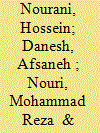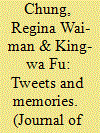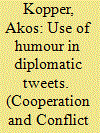|
|
|
Sort Order |
|
|
|
Items / Page
|
|
|
|
|
|
|
| Srl | Item |
| 1 |
ID:
096375


|
|
|
|
|
| Publication |
2010.
|
| Summary/Abstract |
From the establishment of the United States Postal Service and the invention of the telegram, to the introduction of C-SPAN and the explosion of the Internet, the development of new communication technologies has always affected the functioning of Congress. Not surprisingly, recent innovations such as e-mail and social networking have spurred Congress to alter the way it operates as an institution, and rethink the manner in which it engages the public. In this brief examination, I discuss recent changes in congressional behavior and practices due to technological innovation, specifically the proliferation of social networking Web sites. Then, I cautiously predict future trends in the use of social networking and related technologies as they become more integrated in congressional offices and increase the capacity for more robust internal and constituent communications over time.
|
|
|
|
|
|
|
|
|
|
|
|
|
|
|
|
| 2 |
ID:
174893


|
|
|
|
|
| Summary/Abstract |
On May 8, 2018, President Trump withdrew the US from the Joint Comprehensive Plan of Action (JCPOA). Since the JCPOA is endorsed by a United Nations Security Council Resolution and supported by the international community, Trump has had to justify this controversial decision. Based on data extracted from Trump’s Twitter account and taking advantage of Theo van Leeuwen’s (2008) discursive construction of the legitimation model, this article addresses the following question: How has Donald Trump attempted to delegitimize the JCPOA? Findings in this article show that Trump used the strategies of moral evaluation and rationalization in an attempt to delegitimize the JCPOA.
|
|
|
|
|
|
|
|
|
|
|
|
|
|
|
|
| 3 |
ID:
186176


|
|
|
|
|
| Summary/Abstract |
Instead of focusing on the regime’s control mechanism, this study identified a group of Chinese netizens who, despite being well aware of media censorship, posted on social media to commemorate the 1989 Tiananmen Square Massacre annually. Drawing on the concepts of ritualization and social signalling, 1,256 censored Sina Weibo posts published on June 1–4 between 2012 and 2018 were analysed and thematically classified into five categories: collective narratives and counter-discourse, remembrance, condemnation, citizen reporting, and response to current political suppression. The authors argued that tweeting and being censored have paradoxically become a ceremonial ritual for Chinese netizens. By posting serious, playful, and satirical messages, Chinese netizens send costly signals to express dissatisfaction toward the country’s problems.
|
|
|
|
|
|
|
|
|
|
|
|
|
|
|
|
| 4 |
ID:
181534


|
|
|
|
|
| Summary/Abstract |
Today diplomacy increasingly relies on tweets. Yet, as tweets only allow for 280 characters, statements must be brief and impactful, which encourages the use of humour in conveying one’s message. This article scrutinizes irony and ridicule in diplomatic interactions. Even though these forms of humour may antagonize parties and even turn issues into a security concern, this article points out that they also have an affiliative aspect and could play a conflict-mediating role. Because humour, especially irony, is easy to misunderstand (especially in cross-cultural settings), many warn against using them in diplomatic exchanges. Nevertheless, I will argue that they are ideal for expressing multi-layered messages, enabling the speaker to rely on what is often called ‘constructive ambiguity’, which is often useful in diplomatic conduct. Two case studies illustrate the argument. The first focuses on cartoons ridiculing President Wilson in the early 20th century for his reluctance to commit the US to join WWI (suggesting that cartoons of the time might be predecessors of today’s tweets), and the second on tweets published by the British Embassy in London apropos of the Skripal case (offering an example how humorous tweets can convey multi-layered, complex messages).
|
|
|
|
|
|
|
|
|
|
|
|
|
|
|
|
|
|
|
|
|